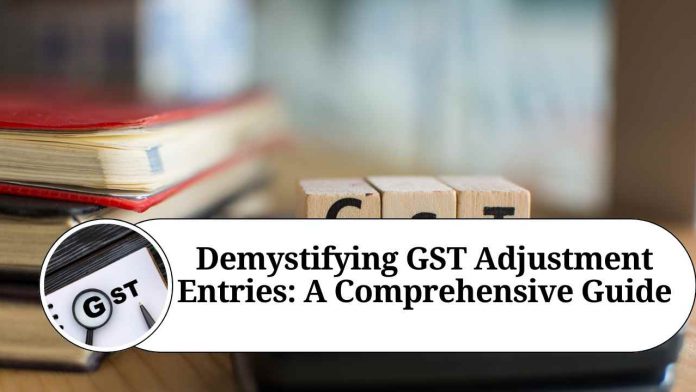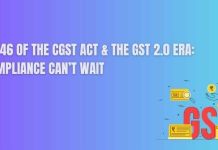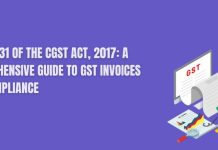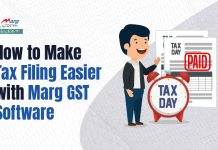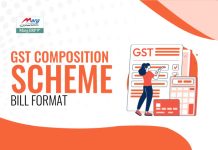Introduction
Goods and Services Tax (GST) is an indirect tax system that has simplified the tax structure in many countries, including India. It is a comprehensive tax levied on the supply of goods and services at each stage of the supply chain. To ensure accuracy and compliance, businesses often need to make adjustments in their GST calculations. In this blog post, we will explore GST adjustment entries, their importance, and how they are recorded in the books of accounts.
Understanding GST Adjustment Entries: GST adjustment entries are accounting entries made to rectify errors or update the GST liability or input tax credit (ITC) in the books of accounts. These adjustments occur due to various reasons, such as amendments in taxable values, incorrect rates applied, input tax credit reversals, or any other revisions in GST-related transactions.
Importance of GST Adjustment Entries: Accurate GST reporting is crucial for businesses to comply with the tax laws and maintain proper financial records. Failure to make necessary adjustments may result in under-reporting or over-reporting of GST liability or ITC, which can lead to penalties, interest, or legal issues. By making timely and accurate GST adjustment entries, businesses can ensure compliance, maintain accurate financial statements, and avoid any potential liabilities.
Types of GST Adjustment Entries:
- Adjustments in Output Tax Liability:
- Revision of taxable value: When there are changes in the taxable value of goods or services supplied, an adjustment entry is required to reflect the corrected amount of output tax liability.
- Correction of tax rate: If there was an incorrect tax rate applied in previous transactions, a correction entry is needed to adjust the output tax liability accordingly.
- Adjustments in Input Tax Credit (ITC):
- Reversal of ITC: In certain scenarios, businesses may need to reverse or reduce the claimed input tax credit, such as when goods are used for non-business purposes or when the supplier fails to pay the invoice amount within 180 days.
- ITC under-billing or over-billing: If there was an error in claiming input tax credit or if the supplier issues a revised tax invoice, an adjustment entry is required to rectify the ITC amount.
Recording GST Adjustment Entries: To record GST adjustment entries, businesses must follow the prescribed accounting principles and maintain accurate documentation. Here’s a general framework for recording GST adjustment entries:
- Determine the nature of the adjustment, whether it affects output tax liability or input tax credit.
- Identify the specific transaction or tax invoice that requires adjustment.
- Create a journal entry with appropriate ledger accounts, ensuring the adjustment is reflected in the relevant GST liability or ITC accounts.
- Provide a clear narration in the journal entry, explaining the reason for the adjustment.
- Calculate and update the revised GST liability or ITC amount in the respective GST returns.
- Maintain proper documentation, including revised tax invoices, credit notes, or any other supporting documents for future reference and audits.
Conclusion
GST adjustment entries play a critical role in ensuring accurate reporting of GST liability and input tax credit. By understanding the various types of adjustments and following the correct accounting practices, businesses can maintain compliance with GST laws, avoid penalties, and have reliable financial statements. It is essential to stay updated with the latest GST regulations and seek professional advice when needed to handle complex adjustment scenarios effectively.
Other Related Blogs: Section 144B Income Tax Act
Frequently Asked Questions (FAQs)
Q1: What is a GST adjustment entry?
A1: A GST adjustment entry is an accounting entry made to correct errors or update the GST liability or input tax credit (ITC) in the books of accounts. It helps businesses rectify any discrepancies in their GST calculations and ensure accurate reporting.
Q2: Why are GST adjustment entries necessary?
A2: GST adjustment entries are necessary to maintain compliance with tax laws and accurately report GST liability and ITC. They help businesses rectify errors, update taxable values or tax rates, reverse or adjust input tax credit, and ensure accurate financial statements.
Q3: What are the common types of GST adjustment entries?
A3: The common types of GST adjustment entries include adjustments in output tax liability, such as revising taxable values or correcting tax rates, and adjustments in input tax credit (ITC), such as reversing ITC for non-business use or correcting under-billed or over-billed ITC amounts.
Q4: How are GST adjustment entries recorded?
A4: To record a GST adjustment entry, you need to create a journal entry in your books of accounts. Determine the nature of the adjustment, identify the specific transaction or tax invoice requiring adjustment, and create a journal entry with appropriate ledger accounts. Update the revised GST liability or ITC amounts and maintain proper documentation for future reference and audits.
Q5: Can GST adjustment entries be made for past periods?
A5: Yes, GST adjustment entries can be made for past periods. However, there are certain time limits within which adjustments can be made. It is advisable to consult the relevant GST regulations or seek professional advice to ensure compliance with the specific guidelines in your jurisdiction.
Q6: What documents are required to support GST adjustment entries?
A6: Supporting documents for GST adjustment entries may include revised tax invoices, credit notes, debit notes, or any other relevant documents that validate the adjustment. It is crucial to maintain proper documentation for future reference, audits, and compliance purposes.
Q7: What happens if GST adjustment entries are not made?
A7: Failing to make necessary GST adjustment entries can result in inaccurate reporting, under-reporting or over-reporting of GST liability or ITC, which may lead to penalties, interest, or legal issues. It is essential to make timely and accurate adjustments to ensure compliance with GST laws and maintain accurate financial records.
Q8: Can I seek professional assistance for GST adjustment entries?
A8: Yes, seeking professional assistance, such as consulting with a tax advisor or an accountant, can be beneficial in handling complex GST adjustment scenarios. They can provide guidance on the correct accounting practices, help navigate the relevant regulations, and ensure accurate compliance with GST laws.
Q9: How often should GST adjustment entries be made?
A9: GST adjustment entries should be made whenever there is a need to rectify errors, update GST liability or ITC, or adjust for any changes in taxable values or tax rates. It is important to make adjustments in a timely manner to maintain accurate financial records and comply with GST regulations.
Q10: Are there any penalties for incorrect GST adjustment entries?
A10: Incorrect GST adjustment entries can lead to penalties, interest, or legal consequences, depending on the specific regulations and tax laws in your jurisdiction. It is crucial to ensure accuracy and compliance when making GST adjustment entries and seek professional advice if needed.

